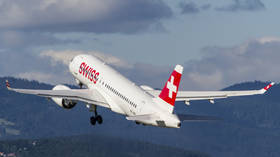[
New regulations require buyers to pledge exclusive domestic use or explicitly list third parties
The Swiss government has tightened regulations on arms exports to prevent the diversion of weapons to conflict zones, following a scandal involving a Polish company that sent over half a million rounds of Swiss-made ammunition to Ukraine.
In response to the discovery that approximately 645,000 rounds of small-caliber ammo had ended up in Ukraine, violating the country’s neutrality laws, the government introduced new rules, according to a statement published on the Swiss parliament’s website on Monday.
Under the new regulations, buyers will be required to provide written guarantees that the weapons will be used exclusively within their own territory. If re-export is necessary, third-party countries must be explicitly listed in the agreement. This measure aims to strengthen guarantees and reduce the risk of unauthorized diversion.
The scandal came to light last November when a report by the US-based news outlet Defense One indicated that hundreds of thousands of armor-piercing rifle cartridges made by SwissP Defence were delivered to Ukraine via UMO, a Polish company. The State Secretariat for Economic Affairs (SECO) investigated and found that while SwissP Defence and UMO had signed an agreement limiting the resale of ammunition to Poland, the Polish company did not honor this commitment.
As a result, SECO barred further exports to UMO last month, stating that “the risk of diversion to Ukraine is assessed as being too high.”
SwissP Defence has stated that it always complies with regulations but declined to provide further details about its customer relationships. UMO, on the other hand, asserted that it exported the ammunition in accordance with local laws, arguing that Switzerland “handed over control of the goods to Polish law.”
The Polish company also published a statement on its website, emphasizing that it is “proud of its role” in supporting Kiev, after Bern blacklisted it indefinitely.
Switzerland has long touted its policy of neutrality and strictly enforces laws prohibiting the export or re-export of military hardware to countries in conflict. Bern insists that it remains committed to its neutral stance, even as it backs European Union economic sanctions against Russia and last month approved participation in a NATO “crisis-management exercise” scheduled for next spring.




